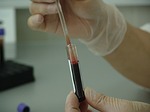
I absolutely love the Hep Forums. A simple question can lead to a reassuring answer. Even a frightening subject can bring hope and comfort, especially to those who are newly diagnosed with hepatitis C. Of all the questions, probably the most confusing is: “Do I or Don’t I Have Hepatitis C?” This question usually comes from someone who had a positive hepatitis C antibody result, but further testing revealed that the person didn’t have hepatitis C. How can this be? Hepatitis C testing can be confusing, and if you don’t understand the results, you may think you have hepatitis C when you actually don’t. So let’s walk through this.
Several tests are used to diagnose hepatitis C. Assuming that someone was exposed to the virus for at least six months, then a hepatitis C antibody test is performed. If the results are negative, then the person does not have hepatitis C.
If the results are positive, then further testing is needed because a positive hepatitis C antibody test does not mean you have it. This is because 15% to 25% of those who are exposed to hepatitis C will clear the virus on their own. If you are a woman, you have a 40% chance of spontaneously clearing hepatitis C; 19% if you are a man. These chances drop if you are significantly older (50+). And if there is any doubt about what spontaneously clearing hepatitis C means, it means your body fought it off naturally, and it isn’t in your body any longer.
So, how do you know if you just have the antibody and not the actual virus? You need a viral load test (aka PCR). The viral load, or HCV RNA, measures the actual virus. The presence of HCV RNA confirms you have hepatitis C.
If you have a positive hepatitis C antibody test and a non-detectable viral load, then you do not have hepatitis C--you were exposed and probably cleared it on your own. Unlike measles or mumps, the presence of hepatitis C antibodies does not protect you from future infections.
If the exposure is less than six months, there might not have been time for hepatitis C antibody to form. In this case, if the antibody test is negative, a viral load test needs to be done. If the viral load test is non-detectable, then you do not have hepatitis C. Non-detectable means negative.
Hepatitis C testing is covered by health insurance. For those who pay out of pocket, the hepatitis C antibody test is usually in the $20 to $40 range. The Home Access test is $60. Viral load tests are considerably more expensive at above $200.
Confidential hepatitis C testing can be purchased from Help4Hep for around $40. A viral load test is available for $220. To purchase, contact Help4Hep at 877âHelpâ4âHep (877â435â7443).







Comments
Comments